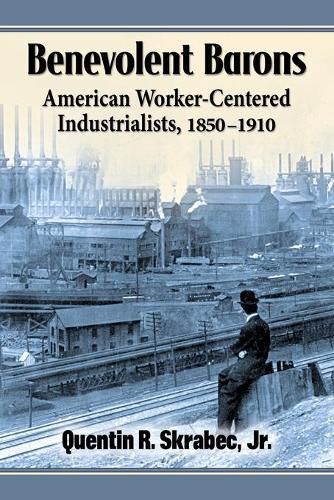Readings Newsletter
Become a Readings Member to make your shopping experience even easier.
Sign in or sign up for free!
You’re not far away from qualifying for FREE standard shipping within Australia
You’ve qualified for FREE standard shipping within Australia
The cart is loading…






This title is printed to order. This book may have been self-published. If so, we cannot guarantee the quality of the content. In the main most books will have gone through the editing process however some may not. We therefore suggest that you be aware of this before ordering this book. If in doubt check either the author or publisher’s details as we are unable to accept any returns unless they are faulty. Please contact us if you have any questions.
American business has always had deep roots in community. For over a century, the country looked to philanthropic industrialists to finance hospitals, parks, libraries, civic programs, community welfare and disaster aid. Worker-centered capitalists saw the workplace as an extension of the community and poured millions into schools, job training and adult education. Often criticized as welfare capitalism, this system was unique in the world.
Lesser known capitalists like Peter Cooper and George Westinghouse led the movement in the mid-1800s. Westinghouse in particular focused on good wages and benefits. Robber barons like George Pullman and Andrew Carnegie would later succeed in corrupting the higher benefits of worker-centered capitalism. This is the story of those accomplished Americans who sought to balance the accumulation of wealth with communal responsibility.
$9.00 standard shipping within Australia
FREE standard shipping within Australia for orders over $100.00
Express & International shipping calculated at checkout
This title is printed to order. This book may have been self-published. If so, we cannot guarantee the quality of the content. In the main most books will have gone through the editing process however some may not. We therefore suggest that you be aware of this before ordering this book. If in doubt check either the author or publisher’s details as we are unable to accept any returns unless they are faulty. Please contact us if you have any questions.
American business has always had deep roots in community. For over a century, the country looked to philanthropic industrialists to finance hospitals, parks, libraries, civic programs, community welfare and disaster aid. Worker-centered capitalists saw the workplace as an extension of the community and poured millions into schools, job training and adult education. Often criticized as welfare capitalism, this system was unique in the world.
Lesser known capitalists like Peter Cooper and George Westinghouse led the movement in the mid-1800s. Westinghouse in particular focused on good wages and benefits. Robber barons like George Pullman and Andrew Carnegie would later succeed in corrupting the higher benefits of worker-centered capitalism. This is the story of those accomplished Americans who sought to balance the accumulation of wealth with communal responsibility.